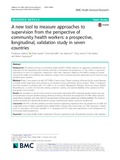| dc.contributor.author | Vallières, Frédérique | |
| dc.contributor.author | Hyland, Philip | |
| dc.contributor.author | McAuliffe, Eilish | |
| dc.contributor.author | Mahmud, Ilias | |
| dc.contributor.author | Tulloch, Olivia | |
| dc.contributor.author | Walker, Polly | |
| dc.contributor.author | Taegtmeyer, Miriam | |
| dc.date.accessioned | 2022-03-13T04:32:18Z | |
| dc.date.available | 2022-03-13T04:32:18Z | |
| dc.date.copyright | 2018 | |
| dc.date.issued | 2018-10-22 | |
| dc.identifier.citation | Vallières, F., Hyland, P., McAuliffe, E., Mahmud, I., Tulloch, O., Walker, P., & Taegtmeyer, M. (2018). A new tool to measure approaches to supervision from the perspective of community health workers: A prospective, longitudinal, validation study in seven countries. BMC Health Services Research, 18(1) doi:10.1186/s12913-018-3595-7 | en_US |
| dc.identifier.uri | http://hdl.handle.net/10361/16443 | |
| dc.description | This article was published in the BMC Health Services Research [© The Author(s). 2018 Open Access This article is distributed under the terms of the Creative Commons Attribution 4.0 International License (http://creativecommons.org/licenses/by/4.0/) ] and the definite version is available at: https://doi.org/10.1186/s12913-018-3595-7 The Journal's website is at: https://bmchealthservres.biomedcentral.com/articles/10.1186/s12913-018-3595-7#citeas | en_US |
| dc.description.abstract | Background: The global scale-up of community health workers (CHWs) depends on supportive management and supervision of this expanding cadre. Existing tools fail to incorporate the perspective of the CHW (i.e. perceived supervision) in terms of supportive experiences with their supervisor. Aligned to the WHO's strategy on human resources for health, we developed and validated a simple tool to measure perceived supervision across seven low and middle-income countries.
Methods: Phase 1 was carried out with 327 CHWs in Sierra Leone. Twelve questions, informed by the extant literature on health worker supervision, were reduced to six questions using confirmatory factor analysis. Phase 2 employed structural equation modelling with 741 CHWs in six countries (Bangladesh, Ethiopia, Indonesia, Kenya, Malawi, Mozambique), to assess the factorial validity, predictive validity, and internal reliability of the questions at three time-points, over 8-months.
Results: We developed a robust, 6-item measure of perceived supervision (PSS), capturing regular contact, two-way communication, and joint problem-solving elements as being critical from the perspective of CHWs. When assessed across the six countries, over time, the PSS was also found to have good validity and internal reliability. PSS scores at baseline positively and significantly predicted a range of performance-related outcomes at follow-up.
Conclusion: The PSS is the first validated tool that measures supervisory experience from the perspective of CHWs and is applicable across multiple, culturally-distinct global health contexts with a wide range of CHW typologies. Simple, quick to administer, and freely available in 11 languages, the PSS could assist practitioners in the management of community health programmes. | en_US |
| dc.language.iso | en_US | en_US |
| dc.publisher | BMC | en_US |
| dc.relation.uri | https://bmchealthservres.biomedcentral.com/articles/10.1186/s12913-018-3595-7#citeas | |
| dc.subject | Community health workers | en_US |
| dc.subject | Motivational | en_US |
| dc.subject | Outcomes | en_US |
| dc.subject | Perceived supervision scale | en_US |
| dc.subject | Scale validation | en_US |
| dc.subject | Supervision | en_US |
| dc.title | A new tool to measure approaches to supervision from the perspective of community health workers: A prospective, longitudinal, validation study in seven countries | en_US |
| dc.type | Journal Article | en_US |
| dc.description.version | Published | |
| dc.contributor.department | Brac James P. Grant School of Public Health | |
| dc.identifier.doi | https://doi.org/10.1186/s12913-018-3595-7 | |
| dc.relation.journal | BMC Health Services Research | |

